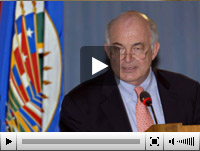- English
Cátedra de las Américas
Twenty Third Lecture - Kemal Dervis
Twenty Third Lecture - October 23, 2007
“Financial Markets, Social Justice and Democracy: Where is the path to equitable and sustainable growth?”
Orador:
Kemal Dervis, United Nations Development Program (UNDP) Administrator
I am very happy to have the opportunity and the honor today to be here in this wonderful room and to share with you some of my thoughts on the world economy, on issues of financial development, financial markets on the one hand and the need for social equity and sustainable growth on the other.
I do it very happily as Chair of the UNDG, UN Development Group. I am responsible for UNDP, as you know, as the Secretary General said, the goal of UNDP is human development. Development measured as broadly as possible in terms of human empowerment. But I should say that I am also particularly happy to share my experience as former economics minister, treasury secretary of my own country.
My own country shares several social and economic features with many Latin American and Caribbean countries. Just two little anecdotes here, we had invited President Ernesto Zedillo of Mexico after he had finished his presidency to give a lecture at the Turkish University. It was his first visit to Turkey and then when he ended his trip he said, “You know what? It so much feels like Mexico.” And really, in many ways, it does. Another funny thing that happened was when I finished working in Brazil last year – one and a half years ago – I was in the plane from Sao Paolo to Brasilia, and my neighbor was reading. I think it was Estado do Sao Paolo and there was a headline, which, although I don’t speak Portuguese, I could understand because somebody in the opposition had said: “If interest rates remain as high as this, I am going to live in Turkey.” That was the headline of the newspaper because Turkey and Brazil were having the highest interest rates among emerging markets for a long time, and Turkey had managed to bring down some of the interest rates. I am sorry to say that Brazilian rates are now lower than Turkish rates. And finally when I went to visit the beautiful city of Buenos Aires we shared a lot with the policy makers there. We fought a very difficult financial crisis more or less at the same time. And I’m very happy to see now that Argentina is growing at very impressive, rapid rate for many years and that the days of the financial crisis are behind them.
Having lived through these financial crises and difficult times when I was in the government, and also working at the World Bank and United Nations, looking at the world economy, at financial flows, I wanted to share with you some of my thoughts of where we are at in this whole situation, where the emerging markets are going in general. What are the challenges? What are the prospects? I will emphasize but not speak entirely on Latin America. UNDP, of course, works a lot on the poorest countries, particularly the poorest countries in Africa. There are also some low income countries in Latin America, which is a priority for the UNDP. But today’s topic is about emerging markets and the challenges that I see for them. I think the key question for developing countries in general, emerging markets and low income countries specifically, today is how to find the path to rapid, but also equitable and sustainable growth. We at the UNDP seek to achieve what we call “human development”, in the face of global pressures that facilitate rapid growth but also seem to lead to inexorably rising inequalities and insecurities felt by citizens throughout the world.
We are living at a time when growth has accelerated. The first six years of the century have probably been the mot rapid growth in history, if weighed by population. At the same time we do see a very, very distinct increase in inequality – all over the world, and not just in developing countries, but also in the rich countries. For example in the recent survey of US citizens when they were asked: “Do you see the United States economy divided between haves and have-nots?” The answer was: 48% of Americans answered yes to this question. The same question was asked in 1980 and only 26% answered yes. So despite a lot of dynamism in the American economy, good times that have characterized the recent past, this issue of inequality is clearly a factor in even one of the richest economies. It certainly is a factor in my country, Turkey, and I know it is important in Latin America and the Caribbean but also many parts of Asia. I think it has become a very, very critical question. Some of these statistics are, indeed, daunting. One of the most dramatic ones relating to inequality is the statistic that 2% of world citizens own 50% of world wealth, and the bottom 50% of all people in the world share only 1% of the wealth in the world. So I think that these statistics give one pause and make one think where we’re heading. It’s very interesting that this challenge of inequality is now well-accepted by the international institutions.


